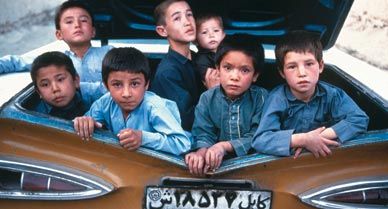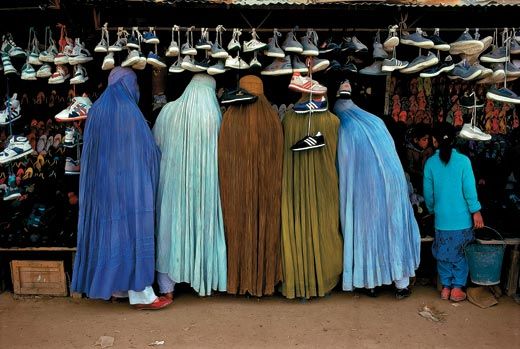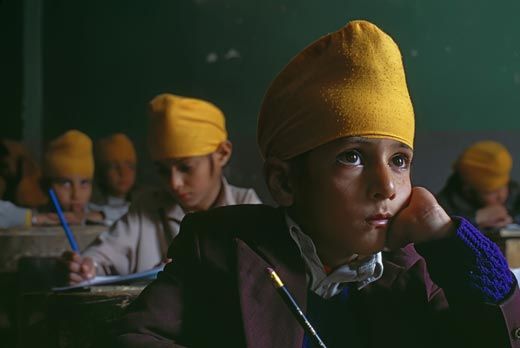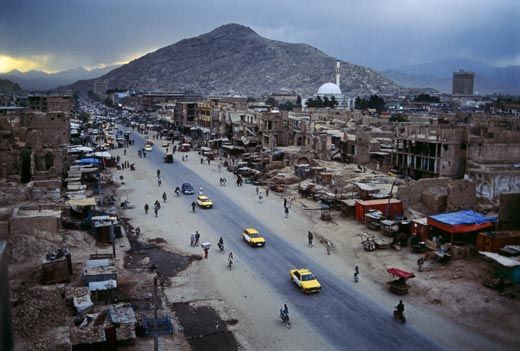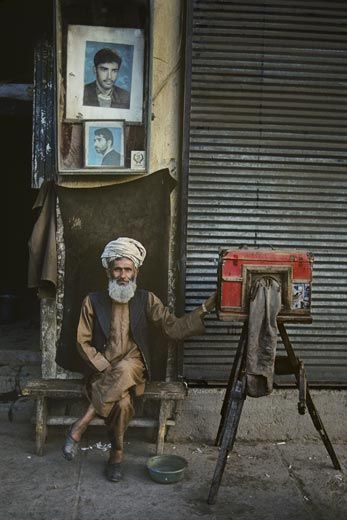Trunk Show
Even in 1992, Steve McCurry says, Kabul was full of surprises
The relic from 1959 was hard to miss. Painted taxicab yellow and battered by the years, the old Chevrolet came lumbering around a corner, cruised majestically down the faded brown streets of Kabul, Afghanistan, and swept past Steve McCurry.
Something about the vintage Chevy, so far from home, struck a chord with McCurry, an American photographer who, in 1992, had just returned to document the war-weary country's reawakening after almost a decade of Soviet occupation.
"It was so out of place. I couldn't believe it," recalls McCurry, whose new book on Afghanistan, In the Shadows of Mountains, includes portraits, landscapes and street photography he has made there over the past 30 years. He chased the taxi down the street, dodging turbaned pedestrians, donkey carts and squadrons of boxy Russian Volgas, but couldn't quite catch up. The taxi disappeared around a distant corner in a cloud of its own dust. McCurry made a mental note to keep his eyes peeled for the yellow Chevy.
"Within a couple of days, there it was again," he says, "and this time it was loaded with passengers." When he says "loaded" he means loaded: with public transportation scarce, Afghans made use of every square inch of a cab, first filling the seats inside, then piling into the trunk and, finally, squeezing onto the roof. "The trunk was full of those kids on their way home from school—nobody on the roof yet," McCurry says. He clicked off a few frames and the car rumbled off, taking its young passengers to an unknown fate.
McCurry didn't have time to get his subjects' names, but he did establish that they were from the Hazara community, a Shi'a Muslim minority often at odds with Afghanistan's dominant Pashtuns, who are largely Sunni Muslims. The independent-minded Hazara make up less than a quarter of the country's population. "They've always been an underdog minority, with other groups making jokes about them," McCurry says. "They used to have a good bit of autonomy in Kabul, but that changed when the Taliban took control in the mid-1990s. I've often wondered what happened to those kids I photographed in the trunk."
McCurry, 57, has been traveling the world virtually without pause since he graduated from Pennsylvania State University's College of Arts and Architecture in 1974. A member of the Magnum photo agency, he has covered conflicts in the former Yugoslavia, Beirut and the Persian Gulf and documented life throughout Asia. He has been to Afghanistan more than 30 times.
He first visited in 1979, on the eve of the Afghans' long war with the Soviets; he slipped across the border from Pakistan dressed as a native tribesman. "I had no visa that time," he recalls. "We literally walked in through the snows and up through the mountains for a look around." He came out the same way, with rolls of film sewn into his clothing. On subsequent forays, McCurry has traveled with mujaheddin fighters, warlords, herders, U.S. troops and others, occasionally ducking hostile fire. In 1992, when rockets started flying around Kabul, he plunged into the closest building he could find—an insane asylum.
"All the doctors and nurses had left," he says. "A few patients were killed. Others were completely undone—just scared to death by the experience. And some were totally oblivious to what was happening. For them it was just another day in Kabul."
Having seen Afghanistan through the Soviet occupation, fighting among warlords, Taliban rule and, now, American intervention, McCurry intends to return for the country's next phase—whatever it might be. "You think you have Afghanistan figured out, you turn the page, and the next chapter is more dramatic, more convoluted and more confusing than you ever imagined it could be," he says.
Robert M. Poole is a contributing editor at Smithsonian.
